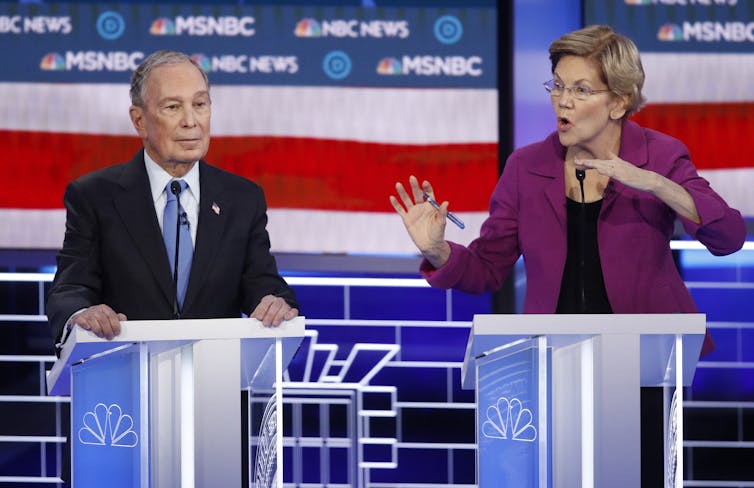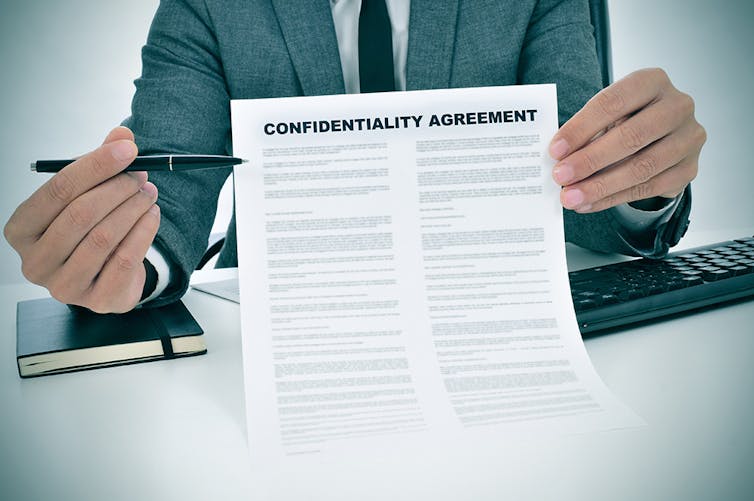
Experts in autocracies have pointed out that it is, unfortunately, easy to slip into normalizing the tyrant, hence it is important to hang on to outrage. These incidents which seem to call for the efforts of the Greek Furies (Erinyes) to come and deal with them will, I hope, help with that. As a reminder, though no one really knows how many there were supposed to be, the three names we have are Alecto, Megaera, and Tisiphone. These roughly translate as “unceasing,” “grudging,” and “vengeful destruction.”
There’s pretty well nothing in this article which couldn’t have already been written (and much of it actually was, regarding Bill O’Reilly) about Trump and Weinstein and a host of others. It’s relevant now – well, it’s relevant all the time, but it’s in the news now because Bloomberg is in the news. And it does clarify the difference between two categories of what are generally lumped together as “NDA”s, and also goes into what some state governments are attempting to to to minimize/mitigate unfairness.
==================================================================
Nondisclosure and secrecy laws protect Bloomberg – not the women who sued him

AP Photo/John Locher
Elizabeth C. Tippett, University of Oregon
Billionaire and former New York City Mayor Michael Bloomberg received a lot of flak at the Feb. 19 Democratic debate for his refusal to release employees who sued his company from nondisclosure agreements.
He admitted to having a “few nondisclosure agreements,” after Sen. Elizabeth Warren challenged him over the issue. They are “agreements between two parties that wanted to keep it quiet and that’s up to them,” he added. “They signed those agreements, and we’ll live with it.”
These types of agreements, also known as NDAs, have been blamed for keeping women silent about sexual harassment and assault in the workplace, particularly in the #MeToo era.
Such contracts, written to keep business information or settlement terms confidential, have been targeted by state lawmakers in recent years, with varying degrees of success.
What exactly are nondisclosure agreements? And why haven’t legislatures been able to fix the problem?
Confidentiality agreements vs. settlements
Media accounts tend to refer to “nondisclosure” agreements as a generic label for any contract that requires someone to keep a secret.
But when I worked as an employment lawyer, we dealt with two different types of agreements containing nondisclosure provisions: standard confidentiality agreements, which aim to protect an employer’s business secrets; and settlement agreements, intended to resolve actual or potential legal claims.
Standard confidentiality agreements are quite common. Employers typically ask employees to sign them at the start of employment to protect the company’s research and development, trade secrets and other nonpublic information.
The problem is that an employee without legal training might believe that these agreements are more restrictive than they actually are. The contracts tend to define “confidential information” very broadly, and a worker might assume he or she can’t speak out about discrimination or harassment.
Legislatures like California have tried to address this problem by prohibiting employers from demanding confidentiality about “unlawful acts in the workplace” – like sexual harassment – as “term or condition” of employment.
This legislative approach can be effective in limiting nondisclosure provisions in standard employer agreements. Companies can comply with the statute by including a carve-out clarifying that employees are allowed to disclose harassment or other unlawful activity.
It’s an elegant legal fix. Companies can still protect their trade secrets through a standard confidentiality agreement. At the same time, the carve-out educates employees about their right to speak out or pursue legal action.

nito/Shutterstock.com
Settlement agreements are different
Settlement agreements are a lot less common. And they present more difficult questions when it comes to secrecy.
Settlement agreements tend to come about when an employee is leaving a job and the employer is paying him or her in exchange for waiving legal claims. They often arise if an employee has threatened to bring a lawsuit or actually filed one against the company. For example, in 2017 former Fox News host Bill O’Reilly reportedly secretly settled a sexual harassment claim by a network contributor for US$32 million.
And it would seem that at least some of the settlement agreements that Bloomberg has with the workers who have accused him or his company in the past of harassment or discrimination contain nondisclosure provisions. Of course, that doesn’t mean we can’t know anything about those cases; court filings and judicial decisions remain publicly available regardless of the terms of a settlement. But, depending on the terms of the agreement, it might prevent the plaintiff from speaking with a journalist about the lawsuit.
Thus far, states have been reluctant to impose an outright ban on nondisclosure provisions in settlement agreements, on the theory that workers might, in some cases, prefer confidentiality. As a result, they have added exceptions that allow secrecy in some circumstances.
In New York, where Bloomberg’s company is headquartered, a 2018 law limited secrecy provisions in sexual harassment settlements to situations where the plaintiff in the lawsuit prefers confidentiality and has been given 21 days to consider the deal and seven to change their minds.
In other words, the law is a speed bump to secrecy, not a stop sign.
Either way, this law applies only to contracts signed after the law went into effect. It is also limited to settlements involving “sexual harassment” claims, whereas some of the claims against Bloomberg’s company appear to arise from alleged sex and pregnancy discrimination and retaliation.
That may explain why Warren was pushing so hard for Bloomberg to release his former employees from their nondisclosure provisions: The law is not on their side. Ultimately, it’s up to Bloomberg.
This is an updated version of an article originally published on Nov. 21, 2017.
[Get the best of The Conversation, every weekend. Sign up for our weekly newsletter.]![]()
Elizabeth C. Tippett, Associate Professor, School of Law, University of Oregon
This article is republished from The Conversation under a Creative Commons license. Read the original article. ==================================================================
Are there any ways to protect oneself in advance? The website Glassdoor dot com used to be a truly helpful resource for people who wanted to know what working for a particular employer was really like. It appears to have turned into just another job search site. It was bought out from the original founders in 2016, although one of them is still acting as CEO; I can’t say how influential that purchase was, or how much of the changes were user-driven. Anonymous reviews of employers are still a part of the the site, but no longer its primary focus. Just looking quickly, I saw nothing about harassment.
Alecto, Megaera, and Tisiphone, The differences in the way these agreements are written can be mindboggling. While I certainly hope no one here will be in a position to have to cope with one, I can ask that you help anyone who is in such a position find really good lawyers.
The Furies and I will be back.
9 Responses to “Everyday Erinyes #205”
Sorry, the comment form is closed at this time.

Great job, as usual, JD.
I like the carve-out that confidentiality agreements must exclude abuse. I used to work in an office, where the management told an employee that her confidentiality agreement blocked her from making a harassment complaint. I read it and told her to see a lawyer, as i didn’t interpret it that way.
In New York secrecy agreements, You can be sure that abused women, who don’t “prefer” secrecy, won’t be offered the settlement.
I enjoyed listening to the law professors, and will have to pass this along.
Excellent post, Joanne.
Thanks so much for getting this out here.
O’Reilly was/is a POS, period!
Bloomie has said that there are 3 NDA’s that he is going to open up, but who knows how many there are. And, I he says he’s changed his stripes, do we believe him?
Thanks, Joanne.
Also hurting employees are noncompete agreements without an end date meaning they cannot go elsewhere or start their own business for a promotion.
Read something suggesting Bloomberg had those working on his campaign sign NDAs–and wonder if they are compliant with CA law since some are working here…
Excellent one Joanne.
Great video.
I kept hearing about the speaking of these agreements and wasn’t that familiar with them.
Reading how companies play these evil sneaky games with their employees especially women. It’s despicable.
Thanks Joanne
I’ve worked as an HR&D manager in The Netherlands for 15 years in several IT and (semi) governmental organisations and I’ve never had to have a new employee sign a confidentiality agreement other than directly related to the work itself nor have I had to sign one myself. In fact, in The Netherlands and now the EU I believe, ‘demanding confidentiality about “unlawful acts in the workplace” – like sexual harassment – as “term or condition” of employment’ would be unlawful. The same holds for any settlements I’ve come across.
Things might have changed a bit in this global economy, but it seems rather an American problem, connected to lesser worker’s protection in general compared to that in Europe. The difficulty seems to be that correcting it now is up to a state, and having it to come up with some remedial legislature ‘after the fact’, i.e. protection in court, and is not the federal abolishment of such confidentiality that is needed. That is indeed quite unthinkable when the CEO’s of those large companies, like Bloomberg, have such a large influence in Washington. Or should I say “run Congress and the administration”?
Oh, don’t leave out the judges and justices. They have a finger on that scale too.
Very interesting – and mostly all new to me.
Apparently it’s one of the perks of medical practice – I’ve never even heard of a NDA being asked for. Non-compete agreements – yes. But not NDAs.
So I appreciate the info.
The days when doctors had “trade secrets” are, thankfully, long gone. Any “medical” person who would claim trade secrets today, would be a snake oil dealer. Unfortunately, we do still have some of those around.